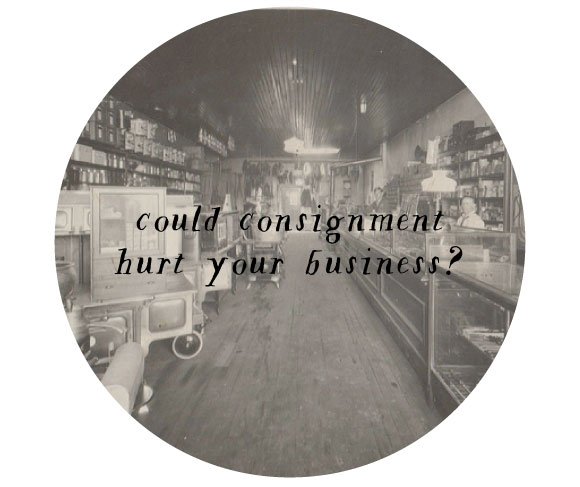Consignee: the maker of goods.
Consignor: The shop or owner of the shop where you are consigning your goods.
Many makers I know ache to have their product in retail stores. Most are looking for a small retail presence to compliment their direct sales rather than to become completely focused on wholesale. Often, those makers will turn to consignment opportunities to sell their product.
An OMHG reader sent me an email responding to an earlier article I had written about entering the wholesale market asking for direction with her business. This prompted me to spend a little more time thinking about wholesale vs. consignment and why consignment can be dangerous.
When a shop BUYS your product at a wholesale price, they are INVESTING in your product. They have a vested interest to display your product, talk to their customers about it, and get it moving. It has value and they want it to succeed as much as you do. If a product is placed on their shelves with no prior investment, it does not have as much of a perceived value in the eyes of the retailer and may simply be a “shelf filler”. Psychologically, they have no incentive to move it as it helps make their shelves look full and when it is sold, they OWE you money which to the retailer feels like just another month-end expense.
Questions also arise as to who is responsible for certain business aspects related to retailing. For example, when I send a wholesale order to a shop the retailer is responsible for the shipping cost. This is the industry accepted standard. The line becomes blurred with consignment: who pays for shipping? Generally it is the consignee.
How is inventory controlled? How often will the consignor pay for items sold? What happens to items that become damaged, shop worn or out of date? In all of these cases with wholesale accounts, there are generally clear channels for retailers to follow: items broken or damaged in the store are the responsibility of the retailer. Any customer service issues are handled via established warranty or product support policies. Where is the consignee left in these situations?
I have experienced both sides of the coin. In university I made beadwork jewelry. I was good at it and decided to sell via a local consignment shop. I even turned down direct sales in an effort to support the consignment shop owner, who insisted she paid her consignors every two weeks. I faithfully would check in every second Thursday to find “she hadn’t written the cheques yet”. This went on for about two months before one day I went in to find the door locked and the merchandise gone. I never did get paid for my product. The store owner practically vanished.
Last year, I sent an Anointment order to a shop with whom I had a prior business relationship with on consignment. This shop is NOT a consignment store but an upscale boutique and I really wanted to have my product marketed there. We agreed to consigning the first order to see how the existing customers would respond with the expectation that all re-orders would be placed via the regular wholesale methods. I am happy to say that the business relationship has worked out well.
As a consignee there are things you can do to help protect yourself. You can establish a consignment agreement between you and the shop you intend to consign with. Think critically about the type of product you are sending and limit the value of your initial shipment to protect yourself.
There are some fantastic, well-established consignment stores out there and sometimes consignment of a first order is a good way to test the waters of a particular market. BE AWARE that consigning is a bit like a lottery, unless you have an agreement in place and/or you know the shop is well established and has a good reputation, you are taking a risk with your product.
For those of you with consignment experience, I’d love to hear your experiences-please share them in the comments!


